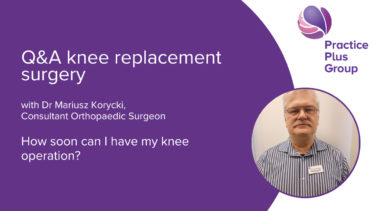Estimated reading time: 7 minutes
If you’ve just been told you need knee surgery, it’s likely your thoughts have already turned to when your procedure will take place. According to reports, the waiting time for knee replacement surgery with the NHS is growing and is set to continue doing so. Private healthcare waiting times are much shorter, but with that benefit, you will need to consider the costs of private surgery before making a decision.
Join us as we take a look at the ins and outs of knee surgery waiting times.

Private knee replacement surgery at a glance
- Waiting time: 4-6 weeks
- Cost: £13,149
- Ways to pay: self-pay, insured, payment plans
- Hospital stay: same day or in-patient
- Procedure time: 1-3 hours
On this page:
The NHS target for knee replacement surgery is a maximum wait of 18 weeks after consultation. However, the actual average waiting time is often longer. In contrast, at Practice Plus Group, the average waiting time for private knee replacement surgery is significantly shorter; between four and six weeks.
How long is the waiting list for knee replacement in the UK?
According to a report from the Royal College of Surgeons in England, the number of patients on the number of patients on the NHS waiting list reached 7.7 million in 2023.1 Of these, over 18,500 had been waiting for treatment for more than two years. Patients facing the longest length of time waiting are for Trauma and Orthopaedic treatment, such as hip and knee replacements.2
In terms of knee replacement patients, the number of people that have been waiting more than two years for hip or knee replacement surgery is nearly 4,000. According to our recent study, 40% of knee replacement patients waited over a year before even getting on the NHS list, so these figures don’t take into account the pre-diagnosis wait time for surgery.
In contrast, the average waiting time for private knee replacement surgery is between four and six weeks.
NHS waiting times for knee replacement surgery in 2024
For NHS England, the statutory aim is for patients to have a maximum waiting time of 18 weeks of their consultation or when the hospital receives their referral letter.
However, the fallout from the COVID pandemic saw waiting times grow for National Health Service patients. Trauma and orthopaedics have the highest waits, with over 800,000 people on the waiting list in March 2024.3
Pre-pandemic waits for knee surgery were around 13 weeks, which then rose to 30 weeks and 2020. They are now around 20 weeks.4
Knee arthroscopy NHS waiting times
As we’ve previously seen, treatment-specific NHS waiting times vary by location. For example, as of January 2024, the waiting time for knee arthroscopy in West Suffolk is 24 weeks from consultation.5
NHS ACL surgery waiting times
In the same region of the UK (NHS West Suffolk), the current waiting time for ACL surgery is 30 weeks from consultation.
Who has priority on the knee replacement waiting list?
Once on the knee replacement waiting list, there generally isn’t priority given to a certain type of patient. The location of the hospital can affect the waiting time, with patients in some areas of the UK waiting longer than others.
Following consultation and diagnostic tests, some patients are also seen as being ineligible for surgery. As such, they aren’t put on the waiting list.
Impact of the pandemic on waiting times for knee surgery
As mentioned previously, the impact of the COVID pandemic on waiting times has been profoundly negative. COVID patients were prioritised over those needing non-life threatening surgery (such as knee and hip replacements). This meant the waiting list grew, and now stands at over 7.7 million.
Waiting times for private knee replacement
We pride ourselves on the speed with which we can get patients the treatment they need. The current average waiting time in the UK for private surgery is between four and six weeks. This can and does vary depending on the provider and location of the patient.
At Practice Plus, the average waiting time from booking enquiry to private knee surgery is between two and four weeks.
How to check waiting times for knee operations
The NHS has a Waiting List Tracker that allows patients to check current waiting list times in their area. It also allows you to filter by treatment, average waiting times, highest waiting times, and much more. The tool is also capable of providing national-level statistics.
At Practice Plus, the average waiting time from booking enquiry to surgery is between two and four weeks. In contrast, the average waiting time for private patients in the UK is between four and six weeks.
Compare hospital waiting times near you
As mentioned previously, the NHS Waiting List Tracker is a useful tool for keeping an eye on current waiting lists. You can also compare by area of the UK. For instance, the tool allows you to see that currently, the Black Country, NHS Kent and Medway, Shropshire, Telford, and the Wrekin, and NHS Hampshire have the highest waiting lists. On the contrary, West Essex and East Staffordshire currently have the shortest NHS waiting lists in the UK for orthopaedic surgery.

Tired of waiting lists?
Ready to be free from pain in your knee?
With short waiting times and flexible payment options, let us help get you back on your feet.
How long should I wait for a knee replacement?
If you’re suffering from the signs you need a knee replacement, it’s best to seek advice from your doctor. There are alternatives to knee replacement that your doctor may recommend. However, if left untreated, you run the risk of developing the following problems:
- weakened muscles and ligaments of the knee
- deformity of the area outside the knee joint
- limited mobility due to chronic knee pain and loss of function
- continued degeneration of the knee joint
- reduced success rate of any future surgery.
If you are paying for your own surgery you can choose your own dates. In this case, you may want to consider the right time of year for knee replacement and when recovery time fits in best to your schedule.
What happens if you wait too long for a knee replacement?
Put simply, the longer you wait for surgery, the greater the risk of developing complications. Waiting too long for surgery can put you at risk of the following issues:
- putting strain on other parts of the body to compensate
- potential for reduced mobility post-operation
- increased pain and lower quality of life.
How can I get knee surgery faster on the NHS?
One way to speed up your knee replacement surgery is to choose a different hospital with a shorter waiting time. Alternatively, you may want to look at self pay or finance options.
Knee replacement surgery at a glance
What can you do while waiting for a knee replacement?
If you have a date for your surgery, you should start to prepare right away by:
- removing hazards from your home (loose rugs and cables) to prevent falling
- placing items within reach
- clearing space for walking with crutches
- asking your surgeon any questions before your knee surgery such as how long does a knee replacement take?
- Strengthening and conditioning your body prior to surgery
- maintaining a healthy weight also reduces the amount of stress put on the knee joint post-op.
Best knee support while waiting for a knee replacement
The use of knee braces has become more common in recent years, as patients seek alternative ways of supporting their injured knees. Different types of knee supports can help patients with differing conditions. For instance, some supports and braces can help reduce the weight and strain passing through the affected part of the knee.
In some cases, this can help delay the need for knee replacement surgery.
Pain relief while waiting for a knee replacement
Anti-inflammatory medication can help significantly. They can help you manage the pain of a damaged knee, allowing you to carry out daily activities and maintain a level of fitness.
With that said, the frequency of medication consumption should be monitored. Ask your GP or consultant for advice on how often you should self-medicate.
Exercise while waiting for a knee replacement
The best exercises for patients waiting for knee surgery are those that don’t place strain on the affected joints. These include the following:
- walking
- cycling
- swimming
- cross-trainer
Your physio or doctor will be able to recommend specific exercises and how long you should do them.
How to reduce the wait and get treatment faster
At Practice Plus Group, we follow a consultant led approach. You will be supported throughout by an expert Consultant and a Private Health Coordinator who specialise in hip and knee replacements.
If, after your initial enquiry, you are eligible for surgery (and happy to proceed), you will receive a no obligation appointment. This will cost £95 and includes your x-ray. It will take place at a Practice Plus Group hospital appropriate for you within 2-3 weeks of enquiry.
After a further consultation, your Private Health Coordinator will help arrange your surgery dates. They will also provide you with all of the relevant information you will require to prepare and start treatment. Surgery normally takes place between two and four weeks of your consultation.
Typical recovery time from knee replacement surgery is around six weeks. You will need to rest when you return home and you are likely to feel tired for a while. Pain relief, ice packs, elevation and a programme of rehabilitation are normal. It is also likely you’ll need to use crutches for two to three weeks after the procedure.

Sources and references
1 https://www.rcseng.ac.uk/news-and-events/media-centre/press-releases/nhs-waiting-list-hits-record-high/
3 https://www.kingsfund.org.uk/insight-and-analysis/data-and-charts/waiting-times-non-urgent-treatment
4 https://www.nuffieldtrust.org.uk/news-item/waiting-times-for-major-surgery-slower-to-recover-in-england-than-in-similar-countries-0
5 https://www.wsh.nhs.uk/Waiting-times/Waiting-times-for-surgery.aspx

Acknowledgements
James Wood, Content Specialist
5,000+

treatments carried out last month
Outstanding

or 'Good' ratings by CQC
100%

clean record for hospital acquired infections
97%

of patients recommend Practice Plus Group



